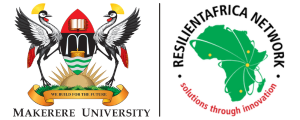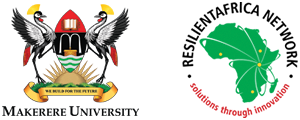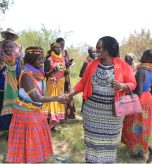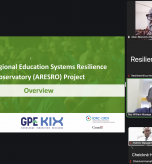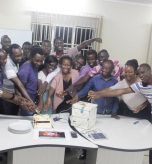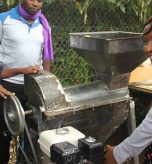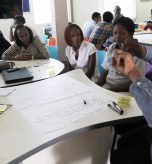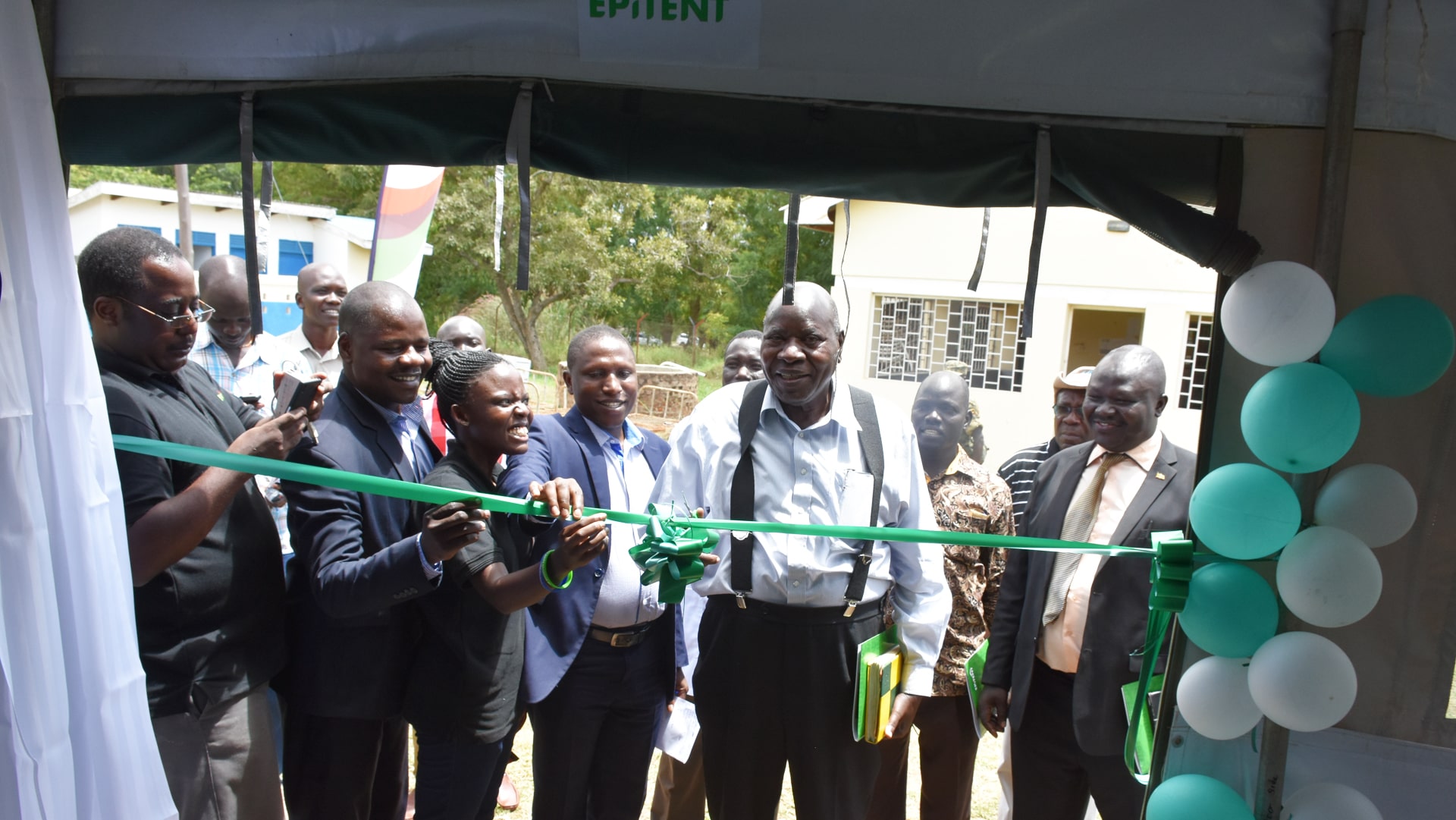
It was a joyful cool mid-afternoon on Friday October 20, 2017 when patients, health workers, district officials, RAN and EpiTent Limited staff, NGO representatives and community members in West Nile Region of Uganda at Adjumani Hospital received two tents ‘which breathe’ from Makerere University School of Public Health ResilientAfrica Network (RAN) www.ranlab.org working closely with EpiTent Limited who are managing further development, local fabrication and deployment these tents. Participants at tis engagement were filled with aww as evidenced on their faces in the pictures take. The big question was ‘But what is the difference between the standard tent structures and this ‘tent that breathes’?’ Well, as everybody is busy with everything, some brains are equally busy and engrossed working behind the scenes to re-imagine certain scenarios, approaches and also structures for the better.
Among other challenges facing the communities in Adjumani district, also Uganda’s hottest district is the critical shortage of beds in not only Adjumani Hospital but also other Health Centers serving both inhabitants and the many refugees from South Sudan into Uganda. The few hospital beds which are available in the wards have in some cases been shared by patients, posing a danger of cross infection or ease of disease spread from one patient to another. This is the second tent that EpiTent Limited and ResilientAfrica Network (RAN) a USAID funded project are donating to the district after the first tent which was offered to and deployed in Ayiri Health Center, Maaji Settlement 11.
During the official hand over of the tent at Adjumani Hospital, Mr. Nathan Tumuhamye, RAN Director Eastern Africa Resilience Innovation Lab who led a team from RAN and EpiTent Limited to this engagement shared that RAN is a university based innovation incubation network www.ranlab.org. The ResilientAfrica Network (RAN) is currently operational in 20 Universities in 13 African countries with the secretariat at Makerere University School of Public Health in Kampala Uganda. RAN is an innovation incubation lab offering support to innovators, students, faculty and the community at large to un-earth communities’ most pressing challenges, interpret them in-depth and work together with everybody else to develop innovative and transformative solutions to address these challenges. Currently under incubation at RAN are over 200 potentially transformative innovative solutions, some of which are already serving or being used by the communities. Some of these solutions include; the Solar Irrigation Pump, Winnowing Maize Thresher, Pedal Tap, Solar Dyer, Improved Push and Pull Technology, Matibabu-non-invassive malaria diagnosis tool kit, RootIO-Community radio among others.
Details about these innovations are shared on http://www.ranlab.org/wp-content/uploads/2016/12/Innovations-currently-under-incubation_June-2017.pdf.
At first look, the re-imagined tent actually appears basic and ‘ugly’, but its special versatile design cuts the average ambient temperature by 7 degrees centigrade and T-Max by 9-12 degrees centigrade over the hottest 8 hours of the day, creating substantial increase in quality of life for humanitarian service providers and users. ALL THIS IS ACHIEVED USING PURELY ADAPTIVE SYSTEMS i.e. no air conditioners; no fans! It also reduces social exclusion of patients under isolation during deadly epidemics. ‘It is almost unbelievable but true that inside this structure is cooler than the outside’ noted Afande Amos Betungura, an official in the Uganda Police Force currently serving at Adjumami Police Post and was also at this engagement in Adjumani Hospital. ‘It is important that we share the fact that, the team of innovators who put together their creative and inquisitive brains to come up with this re-imagined tent are from different disciplines; just for emphasis, it is a multidisciplinary team including; Engineering, Architecture, Medicine, Computer Science, Nursing and humanities like Social Sciences, Arts among others’ shared Ms. Grace Nakibaala, Chief Executive Officer EpiTent Limited.
The tent donated to Adjumani Hospital is accessorized to allow for patients, health workers and care takers’ comfort. ‘Inside, the tent is fitted with hooks so that you can easily hang-up the drip lines, doctors’ medical coats etc., work tops, neatly cabled electricity lines, space to hang-up a television set, notice boards to ease information flow, etc. It is a complete service delivery unit ready for use’ said Mr. Tumuhamye while showing the district, hospital and other officials the interior of the tent. ‘These re-imagined humanitarian service delivery tent aims to substantially change the working environment for health care workers through its ergonomic design which allows for a significant increase in airflow and decrease in ambient temperatures in hot climatic conditions’ shared Dr. Roy William Mayega, RAN Deputy Chief of Party.
The redesigned tent keeps favorable features of current designs (simplicity, cheapness and structural safety) while re-imagining and re-engineering the mechanisms for heat and air exchange within, through integration of a convectional currents mechanism and porous walls (‘The tent that breathes’), without significant increase in cost. The change in ambient environment will have three major advantages over the current ones namely; improved patient management by reducing the heat stress faced by healthcare workers wearing heavy PPE materials, improved comfort for the patients and amenability to ‘plug-in’ accessories to support human-led service delivery (the concept of ‘portable hospitals’). Read more about the EpiTent on https://www.facebook.com/heuca/. ‘At the frontiers of innovation – I am happy to be one of the lead scientists and inventors on this team…’ noted Dr. Roy William Mayega, RAN Deputy Chief of Party.
The Assistant District Health Officer in Adjumani, Mr. Godfrey Manga shared that the innovation in the tent was an addition to improving health care given that it provides a conducive working environment and would also increase the capacity of the hospital to serve those in need. ‘Adjumani hospital has a bed capacity of 100 beds only, this is not even enough for the Ugandan population in Adjumani alone, and the situation is made worse by the high influx of refugees from South Sudan, the hospital is overburdened. Some patients are actually sleeping under the beds which are occupied by other patients in the hospital because the hospital now admits over three hundred patients. This innovation is timely and well allocated here in the hospital because we needed it long ago’ he said.
The Deputy Chief Administrative Officer, Mr. Moses Dalili proposed that since the district may also be prone to several disease outbreaks, these tents could also serve as isolation wards in case of such happenings. ‘Since this idea of the EpiTent innovation was derived from the Ebola perspective that is developed in response to the Ebola epidemic in West Africa which claimed many lives, we have similar epidemics like, cholera among others which confront the district. This could also be a good facility to isolate and manage TB cases other than exposing them to the public’, Dalili added.
The District Vice Chairperson, Mr. John Anyanzo, vividly expressed so much joy and gratitude witnessing and sharing about innovations championed by the university students noting that ‘at least today, we witness something tangible from brains at Makerere University, please keep up this kind of work so that we can together help the communities in need’ he added.
The UNHCR representative at the event, Moses Muhindo shared that the tent was a good innovation and they as a team were looking forward to when Makerere University would attend to the few areas of improvement raised about the ten and also the opportunity to closely work with Makerere University, RAN and EpiTent team to improve service delivery with this structure in place. Currently, UNHCR is the leading tent provider in Adjumani District.
Adjumani Resident District Commissioner (RDC), Mr. Oya Nahori Auwa, said the re-imagined tent is a direct relief for both the refugees and nationals since health service delivery has been over stretched due to the high influx of Sudanese refugees into several parts of Uganda including Adjumani district. The RDC further appealed to all development partners the need for them to emulate what ResilientAfrica Network has done so as to create more space for patient care in the hospital but also ease service delivery (with the ambient conditions within the new tent). ‘Imagine, inside this tent is cooler than sitting outside there under that big tree, God forbid, I wish I could fall sick now so that I am among the first patients to enjoy this ambient environment within this tent’ Mr. Oya exclaimed amidst a lot of happiness to receive the EpiTent.
While in Ayiri Health Center, one male patient attendant who was taking care of his 6 years old sick daughter shared that ‘I have been in and outside this tent for the last two weeks but sincerely it is not only cooler than outside under the trees but also the other tents you see outside there (pointing at the standard tents and those earlier provided by UNHCR) which we were using prior to receiving this one. It is more comfortable inside this tent and I thank you for thinking about us people in Adjumani’. Additionally, a male nurse who was attending to the patients at the time of our visit to Ayiri Health Center said ‘Please send us more of these tents, work inside the improved tent is more humane than in the other tents. At least we can safely store our medical equipment and drugs too inside here. Thank you team from Makerere University for the good work.
‘To uphold Makerere University’s slogan ‘We Build for the Future and RAN’s catchphrase; ‘Solutions through Innovation’, it is important that we all embrace creativity and doing things differently for the benefit of communities in need. We are forever grateful for the continued support from all our partners. Specifically, thank you United States Agency for International Development (USAID) for always being a part of the work we are doing to impact the communities’, emphasized Prof. William Bazeyo, RAN Chief of Party/Lab Director and Deputy Vice Chancellor In –Charge of Finance and Administration at Makerere University, Uganda’s largest higher institution of learning. Our call to action is global and goes to all of us including the angel investors, private sector, governments, NGOs, different funding bodies and individuals among others to join efforts to bridge the existing funding gap. In so doing, we will all be directly contributing to further supporting the completion of work on some of these prominent and scientifically tested/proven innovative solutions so that they are launched in the market for the benefit of those in need and the communities in which we live and serve.
Compiled by; Harriet Adong, RAN Communications Manager
